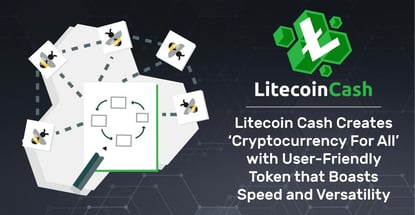In a Nutshell: Litecoin Cash (LCC) forked from the Litecoin blockchain in 2018 with the intention of creating a versatile cryptocurrency that’s mined fairly. Through Hive Mining, anyone with an open wallet can create hives of worker bees that mine LCC coins without the need for expensive or energy-consuming equipment. LCC holders can choose from three digital wallets and will soon be able to store their tokens in the XEEDA hardware wallet.
Every successful business lives within a niche. As a company grows, so does its following. And, sometimes, that niche can come from appealing to the same consumers that other businesses pass up.
When Litecoin Cash forked from the Litecoin blockchain in February 2018, it began a mission to reclaim cryptocurrency miners who had been left behind in the technology arms race.
“When we launched, we found a hole in the market that showed that there weren’t many destinations for miners with older SHA256 gear,” said Tanner, Lead Developer at Litecoin Cash. “This is equipment that maybe they bought a few years earlier to mine Bitcoin, but it no longer has a chance at being profitable on Bitcoin anymore.”
The development team realized there were very few SHA256 mineable coins on the market, and very few companies worked with miners who used slightly outdated equipment. This led to the creation of a cryptocurrency with features attractive to all who wanted to mine it — not just those with the latest equipment.
The next decision was choosing which blockchain to use as its backbone.
“Choosing the Litecoin blockchain as our initial distribution was based on a completely different question separate from the mining equipment,” Tanner said. “We needed to find the fairest way to do an initial distribution that got the coins out to as many users as possible. We decided that piggybacking on nine or 10 years of existing blockchain history is a really good way to do that.”
Approachable Tech Built Upon a Decade of Blockchain History
Most of what LCC does is based on fairness and equality. Many large cryptocurrency offerings, such as Bitcoin, reward miners with the latest equipment and greatest energy expenditure. But LCC strives to create what it calls a “cryptocurrency for all” that levels the mining playing field and still provides the speed and flexibility of the Litecoin blockchain — a place where forks weren’t common when Tanner’s team launched.
“At that time, the market was really familiar with Bitcoin forks, but it was also naturally skeptical because there had been so many scams in that space,” he said. “We wanted the advantages of an IFO (Initial Fork Offering), but without the stigma of doing a Bitcoin fork. We saw this as an opportunity to bring the whole IFO concept into a new space as well as get a really broad launch for our coin.”
LCC’s choice of name also came from its selection of the Litecoin blockchain. During development in 2018, new forks often prefixed their own name with the name of the coin it forked. While the name Litecoin Cash created some confusion, since it prominently uses the name of the popular Litecoin offering, it also worked to draw attention to the new coin.
And that attention created interest — and that interest helped Tanner’s team of developers discover a new passion.
“We realized that what we really want to be doing is offering a sort of mentorship to anyone who wants to build services on top of us,” Tanner said. “We’re very public about being really approachable to give deep integration assistance to anyone who wants to build anything on top of our project.”
LCC’s accessibility and the team’s vast knowledge of the Litecoin blockchain quickly attracted businesses that wanted to build on the blockchain too, but didn’t have the experience to take on the project alone.
“The most real-world example that we’ve seen is our collaboration with the medical research organization ACAIM,” Tanner said. “They’re working to put doctors’ records on the blockchain in a format that you control so that your own data is accessible wherever in the world you need it to be, but only when you’re there and grant permission.”
The Hive Democratizes Mining without Minimizing Rewards
Perhaps the most unique aspect of the LCC token is its Hive Mining capabilities that does away with traditional proof of work (PoW) and proof of stake (PoS) and helps miners with just about any equipment have a fair shot at mining new blocks.
“Traditional proof of work comes with a tremendous energy expenditure because every block is essentially a prize that is being raced to by all of the miner’s hardware,” Tanner said. “The way the race is expressed is through sheer computational power, trying millions and millions and millions of hashes until you hopefully get one that’s good enough to meet the difficulty requirement and get the next block.”
Instead of relying solely on miners with ultra-powerful equipment, LCC brings in more coin participants whose open wallets help decide who should have the right to mine the next block — without accruing exorbitant energy cost.
Other coins have tried to achieve this by turning to PoS — which makes wallet owners justify that they’re able to mine the next block by showing that they’re holding a certain amount of currency. But Tanner said this process has its own flaws.
“For one, whatever initial distribution you start with will have the rich always getting richer and the poor will always get comparatively poorer,” he said. “That’s because the more coins you’re holding, the easier and more likely it is for you to mine more blocks and generate more currency.”
LCC’s Hive Mining does away with the energy requirement of PoW while negating the unattractive quality of PoS. Tanner’s team got the inspiration for the agent-based mining system from colonies of worker bees that live in a hive — similar to LCC’s blockchain.
“You spend currency that gets completely destroyed,” Tanner said. “But, in the destruction of that currency, an on-chain agent is created who has a certain lifespan. You can create your own hive of honeybees that live inside the blockchain, and, so long as your wallet is open for the duration of the lifespan of those bees, they have a chance of mining blocks on your behalf with you getting all of the rewards.”
Tanner noted that Hive Mining is different from PoS because the bees have a limited lifespan. Users must return when their bees die off to create new ones. With PoS, you can potentially run your wallet in a data center on auto-pilot and become a competitive miner with nearly no effort.
Independent developers recently supplemented the innovation of Hive Mining by creating a way for individual miners to pool their resources without the need to constantly keep their wallets open.
HivePool is a method for users to pool their LCC coin and mine the LCC Hive network as a group. The HivePool uses those pooled LCC tokens to purchase bees on behalf of the pool users. When bees find a block and receive a block reward, pool users receive a piece of the reward based on their share of ownership in the pool.
4 Core Wallets: Full, Light, Mobile & Upcoming Hardware
Litecoin Cash offers four Core wallets that appeal to a wide range of LCC holders. Users can download and store the full LCC blockchain locally behind the security of private keys that only the user knows.
Tanner’s team understood the importance of offering a selection of wallets to meet the differing wants and needs of its users. That’s why the group offers light and web-based wallets that don’t require the heavier burden of the core wallet.
“It was really important to have a light option for people who don’t want to download the blockchain,” Tanner said. “Because, when you’re introducing a new coin, you’re often coming with gigabytes of blockchain that people need to download just to claim their new coin.”
Perhaps the most commonly used option is the mobile offering from Coinomi. The light wallet for iOS and Android devices fully supports LCC and was an early supporter of the coin’s development.
And, in the coming months, LCC token holders will be able to store their holdings offline through the XEEDA hardware wallet. XEEDA — currently in the preorder stage — will provide an extra layer of security through biometric authentication, an integrated exchange, and an easy way to store and transact in multiple currencies.
LCC is Boosted by a Strong Community of Users & Developers
Any good business understands that it’s only as strong as its customer base. The same goes for cryptominers who can’t get far without a loyal group of supporters.
Whether it’s developing third-party resources like HivePool or simply chiming in with ideas for new coin attributes, Tanner’s team leans heavily on the feedback it receives from its community of fans.
Tanner is the Lead Developer at Litecoin Cash.
“For quite a while, I didn’t really realize the talent pool that we have in our community,” he said. “We started being much more open between the core development team and the extended coordination team and suddenly realized that we had some really talented designers, copywriters, and developers right here with us already.”
And as Tanner’s awareness grew, he and his team of developers learned to trust the community and expand its role in the formation of LCC — a role that he doesn’t take lightly.
“It’s been awesome to give the community more of an official responsibility,” Tanner said. “We’re also providing some funding to the coordination team so that they can pursue some development projects on top of the chain.”
He said he expects those projects to continue LCC’s goal of innovating the crypto space while increasing the functionality and usefulness of the LCC token. Whether it’s working with a medical records firm, helping international shippers put their database on the blockchain, or helping a local coffee shop accept LCC for a cup of coffee, Tanner never gets tired of seeing how the community explores the token’s potential.
“It’s the most gratifying feeling when someone builds something on top of your project,” he said. “There’s nothing like getting that email that says ‘We built this game on top of your coin’ or ‘We’ve integrated with your service.’ It’s so cool.”
Advertiser Disclosure
CardRates.com is a free online resource that offers valuable content and comparison services to users. To keep this resource 100% free, we receive compensation for referrals for many of the offers listed on the site. Along with key review factors, this compensation may impact how and where products appear across CardRates.com (including, for example, the order in which they appear). CardRates.com does not include the entire universe of available offers. Editorial opinions expressed on the site are strictly our own and are not provided, endorsed, or approved by advertisers.






![4 Facts: Bank of America Unlimited Cash vs. Customized Cash ([updated_month_year]) 4 Facts: Bank of America Unlimited Cash vs. Customized Cash ([updated_month_year])](https://www.cardrates.com/images/uploads/2023/04/Bank-of-America-Unlimited-Cash-vs.-Customized-Cash.jpg?width=158&height=120&fit=crop)
![9 Best Cash Back Credit Cards ([updated_month_year]) 9 Best Cash Back Credit Cards ([updated_month_year])](https://www.cardrates.com/images/uploads/2018/12/cashback.png?width=158&height=120&fit=crop)
![13 Highest Cash Back Credit Cards ([updated_month_year]) 13 Highest Cash Back Credit Cards ([updated_month_year])](https://www.cardrates.com/images/uploads/2019/11/Highest-Cash-Back-Credit-Cards-Feat.jpg?width=158&height=120&fit=crop)
![9 Best Cash Card Reviews ([updated_month_year]) 9 Best Cash Card Reviews ([updated_month_year])](https://www.cardrates.com/images/uploads/2019/11/Cash-Card-Reviews-Feat.jpg?width=158&height=120&fit=crop)
![“Do Prepaid Cards Work on Cash App?” ([updated_month_year]) “Do Prepaid Cards Work on Cash App?” ([updated_month_year])](https://www.cardrates.com/images/uploads/2021/01/Do-Prepaid-Cards-Work-on-Cash-App--1.png?width=158&height=120&fit=crop)
![4 Best Cash Back Credit Cards For Students ([updated_month_year]) 4 Best Cash Back Credit Cards For Students ([updated_month_year])](https://www.cardrates.com/images/uploads/2021/04/Cash-Back-Credit-Cards-For-Students.jpg?width=158&height=120&fit=crop)
![5 Best Bank of America Cash Back Credit Cards ([updated_month_year]) 5 Best Bank of America Cash Back Credit Cards ([updated_month_year])](https://www.cardrates.com/images/uploads/2023/01/Bank-of-America-Cash-Back-Credit-Cards.jpg?width=158&height=120&fit=crop)